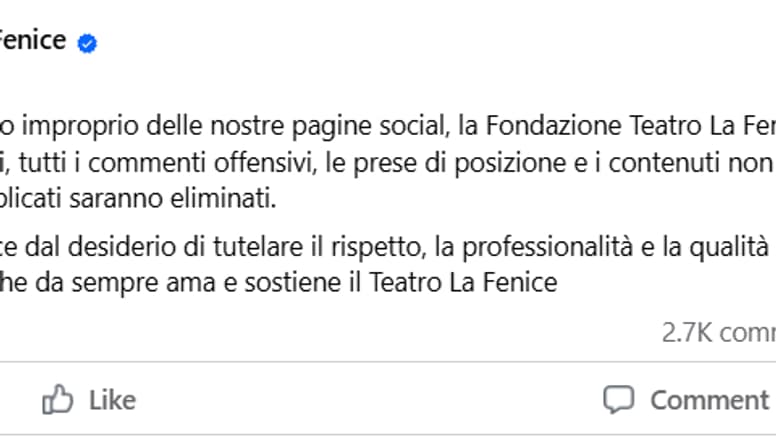Through the streets of Venice, men and women parade with instruments in hand. This Friday, October 17, these Fenice musicians will offer an open-air concert, mixing lyrical melodies with the Italian national anthem. This event is in no way a spontaneous entertainment but a thoughtful protest by the Fenice musicians on strike since October 8.
The temple of Italian opera is going through a crisis since the appointment of Beatrice Venezi, 35, to the position of musical director for the period 2026-2030.
Some explain this promotion, announced on September 22, by the driver’s proximity to power. Beatrice Venezi, music advisor at the Ministry of Culture during the presidency of Giorgia Meloni, already supported the far-right party Fratelli d’Italia during the 2022 campaign. She is also the daughter of Gabriele Venezi, former leader of the neo-fascist party Forza Nuova.
Its name was promoted by Superintendent Nicola Colabianchi, a former activist of the far-right Ordine Nuovo movement. A decision approved unanimously by the president of the Foundation and mayor of Venice, Luigi Brugnaro, and by the board of directors… but not by the orchestra. The custom is for the candidate for this position to meet in advance with the teams so that they can approve it informally. Faced with this outcry, the superintendent attempted to downplay the scope of the position, arguing that “it involves directing an important evening, three concerts and two operas per season.”
For the strikers, the problem does not arise from political opposition – since all opinions exist within the orchestra – but from professional observation. The professional career of the new director does not correspond to the requirements of an institution of this caliber. “What unites us is the realization that his career is still too light for such a demanding position,” explains violinist Eugenio Sacchetti to Release.
“I have seen her conduct in some videos: she is not up to the task. (…) La Fenice is not a training ground for a young conductor,” says Fabio Luisi, musical director of the Dallas Orchestra, in Corriere della Sera.
In an open letter, the orchestra emphasizes that Beatrice Venezi has never conducted an opera or a symphonic concert at the Fenice and that her career is not as experienced as that of her predecessors. “La Fenice cannot be a place of training, it is a point of arrival,” emphasizes Emiliano Esposito, choir artist, in comments collected by Release.
A very sustained mobilization
The protest is not limited only to the Fenice artists. 140 regular customers of the Opera said they were willing to cancel their subscription if Beatrice Venezi’s appointment was upheld. A petition launched on September 26 to demand the driver’s dismissal already has more than fifteen thousand signatures. The 300 employees of the theater demand the cancellation of this event and all the lyrical and symphonic foundations in the country support the mobilization.
Especially since the movement is stalling. The strike, voted on October 8, began on October 17, the day of the premiere of Wozzeck by Alban Berg that closed the season. On October 19, on the occasion of the second performance of the Austrian work, the members of the orchestra read a new union press release from the palcoscenicoreceiving applause from the public.
On October 23, the theater union representations (CGIL, CISL, UIL and Fials) took a new step by formally calling for the resignation of superintendent Nicola Colabianchi. In their statement they affirm that “the management of the Superintendency has irreparably broken the relationship of trust with the Theater workers.”
The movement grew so much that the next day, the theater announced that from now on it would eliminate all offensive comments or positions unrelated to the publications, after the post announcing the nomination received more than 7,000 comments, almost all of them critical.
Mayor Luigi Brugnaro, president of the Foundation, described the protest as “disrespectful towards the public and violent towards Venezi”, inviting the musicians not to oppose the outdoor Christmas concerts. He also singled out cellist Marco Trentin, secretary of the Italian Federation of Cellists (FIALS), describing him as “a popular artist who will retire in a few months.”
The response from the unions was immediate, according to the local newspaper Corriere del Veneto which quotes a letter addressed to the mayor on October 25: “If you really think that this is political manipulation, that authorizing a public demonstration is a matter of your benevolence and not a democratic right (…), that those who create culture can be reduced to a Christmas shopping soundtrack, that speaks for itself.”
Source: BFM TV


